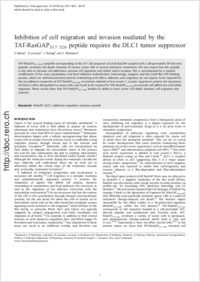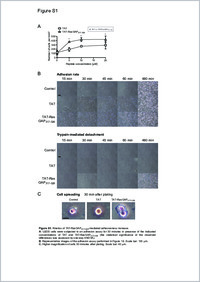Inhibition of cell migration and invasion mediated by the TAT-RasGAP317–326 peptide requires the DLC1 tumor
- Barras, David Department of Physiology, University of Lausanne, Switzerland
- Lorusso, Girieca Department of Medicine, University of Fribourg, Switzerland
- Rüegg, Curzio Department of Medicine, University of Fribourg, Switzerland
- Widmann, Christian Department of Physiology, University of Lausanne, Switzerland
-
11.11.2013
Published in:
- Oncogene. - 2014, vol. 33, no. 44, p. 5163-5172
English
TAT-RasGAP317–326, a peptide corresponding to the 317–326 sequence of p120 RasGAP coupled with a cell-permeable TAT-derived peptide, sensitizes the death response of various tumor cells to several anticancer treatments. We now report that this peptide is also able to increase cell adherence, prevent cell migration and inhibit matrix invasion. This is accompanied by a marked modification of the actin cytoskeleton and focal adhesion redistribution. Interestingly, integrins and the small Rho GTP-binding protein, which are well-characterized proteins modulating actin fibers, adhesion and migration, do not appear to be required for the pro-adhesive properties of TAT-RasGAP317–326. In contrast, deleted in liver cancer-1, a tumor suppressor protein, the expression of which is often deregulated in cancer cells, was found to be required for TAT-RasGAP317–326 to promote cell adherence and inhibit migration. These results show that TAT-RasGAP317–326, besides its ability to favor tumor cell death, hampers cell migration and invasion.
- Faculty
- Faculté des sciences et de médecine
- Department
- Médecine 3ème année
- Language
-
- English
- Classification
- Biological sciences
- License
-
License undefined
- Identifiers
-
- RERO DOC 209526
- DOI 10.1038/onc.2013.465
- Persistent URL
- https://folia.unifr.ch/unifr/documents/303439
Other files
Statistics
Document views: 162
File downloads:
- pdf: 257
- Supplementary material: 156

